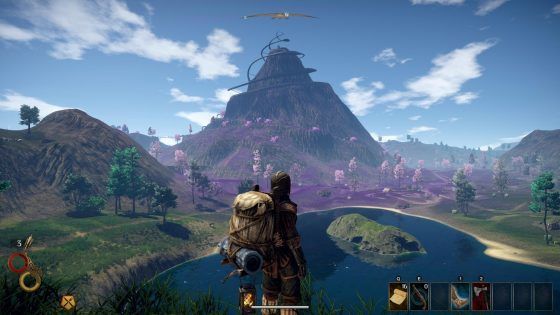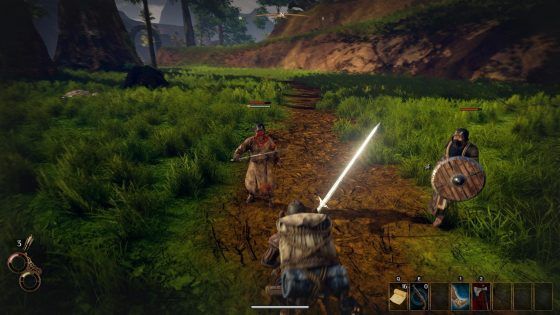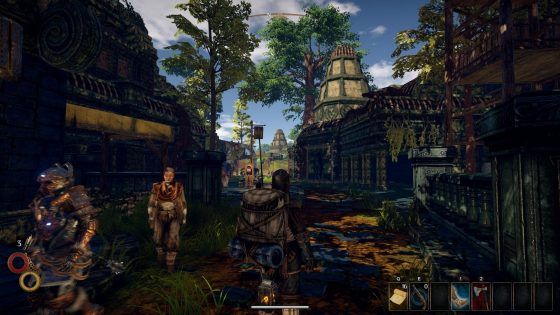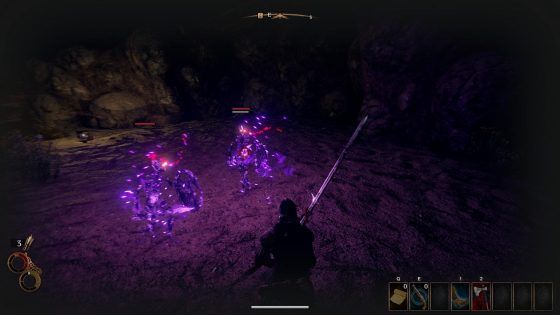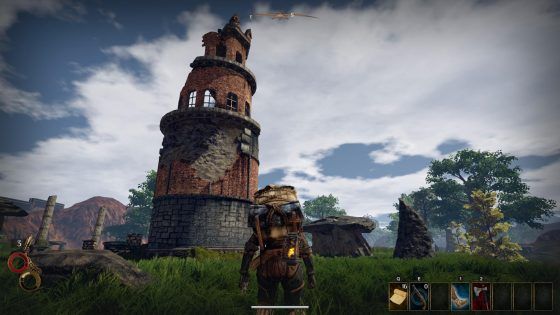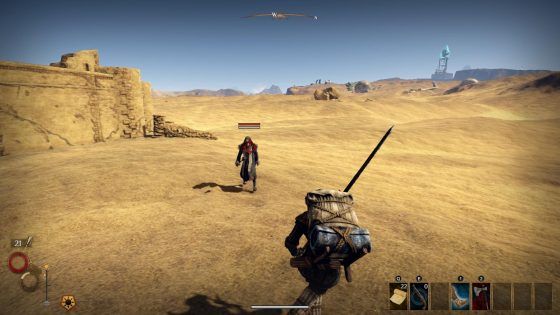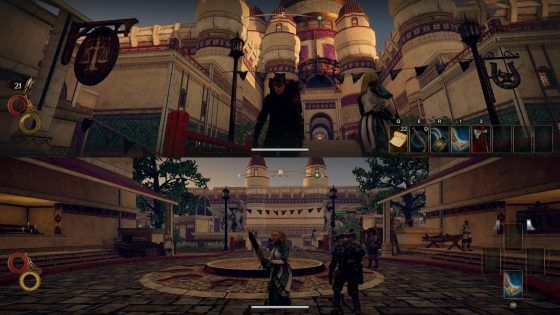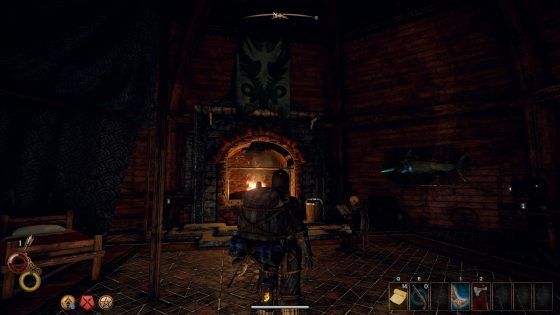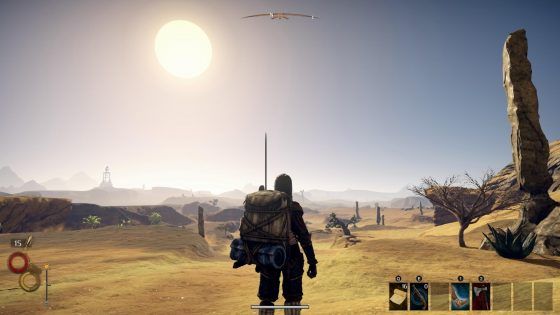Outward is a game designed to make you feel lost and overwhelmed. It places you in a harsh and ruthless world without any sort of hand-holding and simply asks you to forge your very own memorable odyssey. You are not special, you’re not the chosen one and you don’t have any sort of spirit guide or any friends in high places. You are the same ordinary individual just as every other human sitting right next to you in this forsaken world of Aurai. Let that sink in. So, what are you going to do about it?
This may not seem the greatest starting point for a grand adventure, or the best-selling point for an RPG, but it makes for a refreshing change. Your victories come at the expense of your persistence and sweat, and comparisons between Outward and Dark Souls may be exaggerated but aren’t completely out of place. This is an equally brutal and frustrating adventure where survival isn’t a word so much as it is a rule, something that you will regularly fail at in the most awkward places and inconvenient times. It’s challenging for sure, but it’s rewarding as very few survival games manage to be.
Character creation is bare-bones and there are no classes to choose from, but this is by design, not by accident; you become what your actions dictate. You shape your own class through gameplay choices – will you become a sword-wielding knight or a cunning magician? Choose wisely, as switching roles is something that comes at a nearly prohibitive cost.
Death Is Only the Beginning
Outward features a sprawling, diverse world divided in a few huge regions. There are several landmarks in each territory to keep you exploring and discovering new and challenging dungeons and loot, but the maps can also feel somewhat empty. You will spend a long time running in Outward, especially when you are still learning the ropes and charting stuff in your head. It can and will get tedious, as there are no mounts to speed up your movement, or any kind of fast travel.
The lack of fast travel will lead to several heated debates, but developer Nine Dots Studio is adamant about its decision. After all, Outward is meant to be a game where every choice matters, including the long journey to your next destination. Are you fully equipped to go to the Abrassar Desert or should you travel to Berg city in the Enmerkar Forest? Do you have the necessary travel rations (essentially food and water) to successfully go the distance and face the dangers that lie in wait? You can equip some gear that improves your speed, but it is always up to your trusty boots to do the bidding.
Every decision matters in Outward, almost in some sort of obsessive-compulsive behavior. The Abrassar Desert is a great example, with its blazing hot sun during the day and freezing nights. You must be prepared with appropriate clothing with heat resistance and carry with you some items that have adequate properties. If you know your way around Aurai you may even meet a trainer that offers a temperature-resistance skill. Nothing happens by chance.
Your ordinary hero-to-be can’t jump, swim or climb ladders. I’m inclined to think that jumping isn’t a missing feature or an oversight but a deliberate decision made to avoid absurd behavior in combat and bug exploiting, which is something that is prone to happen in rich sandbox RPGs such as The Elder Scrolls or the Fallout series. Jumping would surely help cut a few corners during the longest journeys but would probably get you stuck in the occasional rock or two – I did stumble across my share of bugs.
You can check a region or city map whenever you want, but this is another feature that is designed with no hand-holding mentality. Your character isn’t shown in the map and neither is your destination; you must interpret the landmarks and learn your whereabouts if you want to go anywhere. There is no mini-map at all, no quest markers, only a useful compass that does what it says in the tin: if you want to go north, go north. That is all the help that you get, so use your real-life skills and start assembling all the little pieces with your brain. Quest objectives are often vague as well – “find a tomb in North-East Chersonese” is a good example – but I enjoyed this old-school approach to role-playing, where you must work with what you get. The joy of discovery is unmatched and brings you an immense satisfaction when you accomplish seemingly impossible feats.
Eventually, you will die in dozens of different ways. However, there is no such thing as death in Outward for the player, as that would surely prematurely end your amazing tales of adventuring. Instead, each time that you succumb to a sharp blade, infection, beast claw or others, a random event is triggered according to the region and area where you found your demise. You may find yourself imprisoned, dragged into a dank cave, rescued by a daring and mysterious adventurer, among many other possibilities. No matter where you are, you can always escape and resume your quest, but make sure to search your surroundings as your backpack and a few objects may be scattered around. The novelty will soon wear out and repetition sets in, but this is a very interesting idea.
While you can “cheat” death, it usually comes at a price. Low health and stamina is the most common outcome, forcing you to drink some potions or travel to a safe location so that you can take an invigorating nap. To do so you need to find a bedroll first and later, when you managed to save some silver coins, purchase a cozy tent; you can even go nuts and buy a luxury tent for improved resting, if you can afford it! Sleeping in the wild will place you at risk of being ambushed, so you need to spend some time on guard duty if you do not want to be surprised. You can get your very own house in one of the cities that your travels take you to, but considering the time spent running around, this doesn’t seem like a particularly enticing offer.
Outward is a game where you must live with the consequences of your actions. Joining a faction is a very serious decision, but you can delay your verdict until you have a decent knowledge of the world and the beliefs of each party. Drop an item in the middle of nowhere and good luck finding it again. Enter a haunted tomb without the skills or gear to tackle the challenge and you’ll be lucky if you get to sneak past the first enemy. Auto-saving will ensure that you will always have to ponder your actions and suffer the consequences – or relish the rewards of bravery.
Size Matters
The two things that you utterly need before setting off to explore uncharted territory (besides travel rations) is a bedroll and a backpack. Never, ever underestimate the importance of a backpack, as Outward is an RPG with tons of loot and you need the space to carry it. You won’t feel like a real adventurer until you purchase a sparkling, brand-new trader backpack, which carries 100 pounds of loot. This won’t solve all your carrying problems, but I’ll be damned if I didn’t feel like a weight was lifted off my shoulders – sounds ironic, given the subject at hand.
The backpack carries everything that you need to succeed, from food to weapons, armor, potions and every kind of conceivable ingredient. There are several real-life factors that come into play such as equipment that slowly degrades, food that rots, raw fish and meat that must be cooked or you risk indigestion and other diseases, as well as special concoctions that imbues you with some buff when drunk – just like your regular cup of coffee, right?
If you have a cooking pot and all the necessary items to make a campfire, you can try your hand at cooking. Alchemy and crafting are other full-fledged options, although I chose the path of the Dark Souls-like warrior, so I didn’t really get to explore the unfathomable world of spellcasting in Outward. However, I did find my share of evil wizards and witches along the way.
Your character doesn’t earn experience or grows his skill-set as you complete quests. You need to reach out to trainers to learn skills that improve your abilities in various areas; I love my new and shiny slow metabolism skill, which means that I don’t feel so hungry or thirsty anymore! It’s a time-consuming journey, but once you get that extra buff and you feel confident for your next challenge, it will make it all worthwhile.
Combat is where Outward gets frequent comparisons to Dark Souls. Both games feature this brooding, no-mistakes-allowed feeling to each confrontation, where skill is of utmost importance, but it won’t hurt if your gear is up to scratch as well. Facing two opponents is a task that you should absolutely avoid unless you are a seasoned adventurer, as even shielding yourself is a move that consumes stamina. One of the tricks to be more agile is to drop your backpack on the ground, while the art of setting traps or throwing your lantern to briefly create a circle of fire aren’t to be neglected.
It must be said that combat is a bit clunky. Some creatures are too willing to attack and hit detection may be somewhat flimsy. Combat could be improved when it comes to some of the very peculiar fauna of Aurai, but I’m pleased with the slow, tactical skirmishes with other AI-controlled human characters.
Luckily, there is more to your enemies than what it seems at first. It’s not unusual to spot bandits being attacked by hyenas or other dangerous creatures, something that often brings a smile to my face as I merrily move along unbothered and, most importantly, unscathed. On the other hand, running away from these foes can be a tedious process that tends to repeat far too often – most of these fellows cling too hard to their prey.
Dungeon exploring is an entirely different scene. The narrow hallways and dark areas are most suited to a stealth approach, unless you are skilled enough to go on a relentless rampage. Hang your lantern on your backpack to free one of your hands, slowly but steadily move in the shadows without making a sound (don’t forget to turn off your lantern in the presence of enemies), until you are inevitably spotted by a patrolling creature and chased like there is no tomorrow. Lost and confused in this new maze that is about to become your tomb, use whatever little time you have left to mentally map the area because you’ll need the valuable knowledge for your next incursion. The first dungeons may take 15 minutes or so, but later it won’t be uncommon to find yourself knee-deep for an hour or so. All of this in the hopes of finding some valuable loot.
Outward brings a great idea to the party, which is two-player co-op gameplay, either split-screen or online. I’ve tried the split-screen option using a gamepad and I can say that this is a wonderful addition. Playing with the gamepad is intuitive and having an adventurer friend opens a lot of possibilities such as loot sharing and combining combat strategies.
Gameplay: 8/10
There is so much to say about Outward’s gameplay that I feel like I haven’t even scratched the surface. Here is an outstanding, expansive game that begs for a second or third playthrough just to see where the other main questlines will lead you. The persistent time system affects some of your quests, and the passing of the seasons is dutifully reflected in the game world and affects your character’s temperature.
Granted, there is a lot of traveling and it may get tedious when you realize you have 20 minutes of nonstop running to your next objective. However, this is only an issue if you don’t know what kind of game this is – one where you are bound to lose yourself along the way, thinking “I didn’t notice that exquisite monument before, what riches may it hold?”
Combat can feel both tactical and clunky, depending on your foe, but one thing I know for sure: you are always given a choice in every situation. Even if it means tucking your tail and running away until you are better prepared.
Innovation: 7/10
Outward isn’t so much a case of innovation as much as it is a tribute to classic RPG series such as Gothic or Two Worlds. Outward’s innovation lies in the fact that it looks to the past to deliver an uncompromising vision that isn’t tarnished by the newer role-playing games that try to appeal to a larger, casual crowd.
Learning Curve: 4/10
Prepare yourself for a challenge, as you are bound to feel overwhelmed and frustrated during your first hours. Don’t give in and you’ll find a rich open world that has the capacity to amaze and surprise you – it is absolutely worth the early struggles.
Graphics / Sound: 7/10
Nine Dots Studios is a team comprised of ten people and general reasoning should tell us that they wouldn’t be able to create high quality graphics for an open world RPG. Partially that is true, especially when you look at the crude character models – the character creation screen is probably the ugliest thing that you will ever see in Outward.
However, you must look at the big picture and that is where you will discover some amazing sights. The different regions have several landmarks that feel meticulously designed, an incredible organic feel to the flora in some places and some truly huge creations that can be seen from miles away, such as the majestic Conflux Mountain right at the start. The seasons deliver some outstanding effects including snow-covered fields and grass in beautiful purple colors that will surely catch your eye. It is a picturesque world when you don’t think too much about the details.
The sound effects are serviceable and voice work is mostly average, but the soundtrack is nothing short of amazing. So much that it was made available for everyone to listen outside of the game.
Value for Money: 9/10
It is not a cheap game but Outward is worth every single penny. You will spend dozens of hours exploring the landmarks, conquering the dungeons and progressing your character. Additional playthroughs are almost mandatory, and bringing a friend elevates the experience to a whole new level.
Overall: 8/10
Outward isn’t a game for everyone. It’s challenging, rough around the edges and you need to persevere during the initial three our four hours to finally see some progress. Slowly it starts to creep under your skin, each new region being its own reward, each new jaw-dropping landmark filling you with awe and a true sense of accomplishment. How you’ve grown, from someone in its undies into a daring warrior carrying a larger-than-life sword.
If you do your homework and know what you are getting into, Outward may be your game of the year. It is a brutal, rewarding, old-school RPG where you forge your path as much as you will die trying. As corny as it may sound, Outward brought back that warm, fuzzy feeling inside when you accomplish a difficult deed or complete a quest without the usual signposting seen in nearly every RPG nowadays. And for that it deserves all the praise.
Pros
• Incredibly deep and rich RPG
• Vast world filled with landmarks and surprises
• No hand-holding or signposting, you are what you achieve
• So much freedom and consequences to your choices
• Online and split-screen co-op play
• Combat is tactical and unforgiving…
Cons
• … Although a bit clunky as well
• Somewhat rough around the edges
• Crude character models
